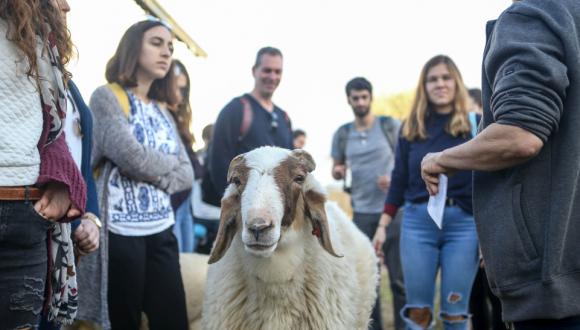Toward New Respect for Animals
In 2003, a landmark decision of the Israeli Supreme Court ruled that the force-feeding of geese and ducks for the production of foie gras represented cruelty to animals and was therefore in violation of the law. The progressive ruling led to the banning of the practice.
Now, with animal rights issues a growing area of engagement in Israel, TAU’s Environmental Justice Clinic at the Buchmann Faculty of Law, operating since 2001, has expanded its scope to the protection of animal rights and welfare. The new clinic integrates both theoretical studies and practical legal work in the rapidly developing field of animal law, advocating for the rights of those who cannot speak for themselves and are entitled to dignity, compassion and a life free from suffering.
The Clinic works to broaden the definition of animal law within the legal community, with the aim of making law and justice in Israel more effective in protecting animals. Its work will be complemented by the course in Animal Protection Law being taught this academic year at the Buchmann Faculty with the generous support of the Jeremy Coller Foundation.
As a pioneer of clinical legal education in Israel, the eight legal clinics of the Elga Cegla Clinical Law Programs deal with hundreds of cases relating to human rights; Holocaust survivors and the elderly; worker's rights; refugee rights; criminal justice; housing; the environment; and class action.
The Animal Rights Clinic, the first of its kind in Israel, operates under the academic supervision of Vice Dean of Law, Prof. Issi Rosen-Zvi, and the clinical instruction of attorneys Dr. Eran Tzin and Amnon Keren. Students participating in the clinics earn academic credit while gaining valuable experience in litigation in a range of rights issues.
The Clinic examines issues such as the philosophical and social justice concepts of animal liberation, animal protection laws and policies, and the intersection of animal and environmental protection in the spheres of biodiversity, wildlife and conservation and the impact of livestock farming.
“Our students engage in eager, at times heated, discussions, reflecting the complex and multifaceted nature of the subject. The discussions demonstrate the vague spectrum which animals inhabit in human lives, as sentient beings caught somewhere between property and products, to best friends and cherished members of the family,” says Prof. Rosen-Zvi.
On the practical side, the Clinic is currently involved in three projects. First, through collaboration with the Class Action Clinic, they have taken action against one of Israel's largest meat producers, who has been exposed time and again for animal cruelty. In a second case, the Clinic is filing an injunction against one of Israel’s major egg producers, with the objective of ending the intensive confinement of hens kept in battery cages, a field in which regulatory authorities have consistently failed to take action.
The third project is a research initiative, carried out with the US-based Nonhuman Rights Project (NhRP), concerned with developing the legal status of animals and attaining the recognition that animals are entitled to certain fundamental rights, such as bodily liberty and bodily integrity. As part of this collaboration, the Clinic held a conference in April 2018, "Unlocking the Cage – Recognizing Animals as Legal Persons," the first of its kind in Israel. The keynote speaker was attorney Steve Wise, Founder and President of NhRP and one of the world's preeminent legal scholars in the field of animal rights.
As the Clinic moves towards exploring the possibilities and challenges of filing further petitions, it hopes to instigate a profound change for animal protection in Israel.
“Animal protection organizations are the guardians of animal rights in Israel, and the Clinic sees itself as a connecting force between social activism, the law, and academic discourse,” says Clinic attorney Amnon Keren.
TAU Clinics promote social change
In fulfilling its mission to advance legal and social change for people of all religions, ethnicities, nationalities, races and genders, the Clinics have argued landmark cases and reformed governmental policies and legislation by drafting bills.
The Criminal Justice Clinic brought about the establishment of the National Public Defender's Office in Israel in 1995. The Human Rights Clinic has successfully fought for the rights of the LGBT and transgender community in their struggle for equality.
The Workers' Rights Clinic provided substantial legal support and infrastructure for the establishment of a new, independent general trade union. The Holocaust Survivor's Clinic provides legal consultation and representation in court and in medical committees on a wide range of issues. One of its numerous achievements included increasing compensation for survivors.
These are just a few of the countless achievements of the clinics in the last two decades, with the most significant being educating students to advocate and promote social justice values through hands-on, practical and experiential clinical legal education, empowering future agents of change.






